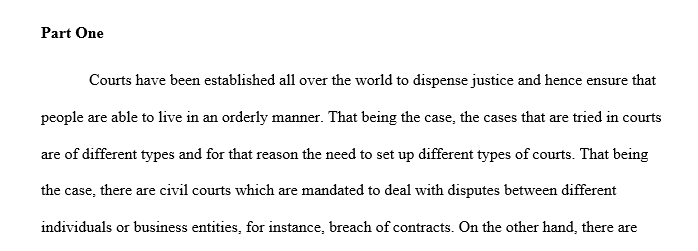Forms of law-civil and criminal
Response:
There are two forms of law-civil and criminal, whose purpose or intent is to punish those that commit to wrong doing. The key differences between civil and criminal is based on how they are handled and how they are punished or penalized and how proof is presented.
Civil law deals with disputes between individuals or a business entity that files a complaint against another party. The person or persons in the wrong are not punished as you would a criminal but is punishable by retribution to right their wrong. If a person’s behavior cause injury to another person are persons such as using slander, breach of a contract, property damage, etc., these cases are presented to a judge and usually ends with a monetary retribution from the defendant to the plaintiff that presented the proclaimed liability. The person that is responsible for the suit is the person that harm was done to.
Criminal law is not so easily punished and the person that caused the offense is prosecuted by the State. Criminal law is used to prosecute people whose actions are much more severe, such as drunk driving, negligence or malpractice, assault, murder, etc. When a person’s actions are interpreted as offensive by others in society it is punishable by law because more than likely there is something in place that interpreted it as offensive. Proverbs 10:9 (New International Version) “Whoever walks in integrity walks securely, but whoever takes crooked paths will be found out.” Criminal cases are initiated by the federal and state government and punishable by serving jail or prison time, and/or paying a fine that must be based on a reasonable doubt.
****Dq 2
Read the response below and write a 100 word response.
Response:
In some cases, according to Miller (2016) a criminal act can be dismissed if a person has proof that they acted in self-defense and that their actions were defendable or valid, under the circumstances. Not everyone is a criminal that commits a crime, such as when a person is forced to defend themself from harm of another person. The various defenses to criminal liability that someone accused of a crime can use as to their advantage are: justifiable use of force, necessity, mistake, and entrapment, statute of limitations and immunity, pp 132-134.
Justifiable use of force is what Miller (2016) considers the best-known defense and that is self-defense. People have a right to protect themselves and their property. Necessity is a criminal act that was done to prevent an even greater criminal act from occurring. Insanity can be a cruel monster that can cause a person whose mental state is incapable of committing a crime. A mistake is one of those scenarios that are rare but can occur. Duress is one of those situations that lead a person to go into survival mode and their mental state is excluded as part of the determination of the crime because when a person is forced to commit an act to survive it is considered their defense mechanism. Entrapment is a defense that is used to ward off those in authority like the police. If you are a criminal and a situation to trap you occurs that is not entrapment. Entrapment means you can’t be pushed into committing a crime. The statute of limitation used as a defense after a specified time period has passed. The statute also applies to criminals. Immunity can be very favorable if a person chose to provide information for the police that will lighten their sentencing. Immunity also allows a person to plea bargain for less time served. Immunity is like a contract you are indebted to provide the information. For example, if a person is caught robbing a bank and is about to serve time, they will gain immunity if they turn the other accomplices in. The person uses this opportunity to pleas bargain the length of time to serve, pp 133-134.
Reference
Miller, R.L., & Jentz, G.A. (2016). Fundamentals of Business Law today: Summarized Cases (10th Ed.). Mason, OH: Thomson-West Publishing. ISBN: 9781305075443
Solution preview for the order on forms of law-civil and criminal
APA
231 words
